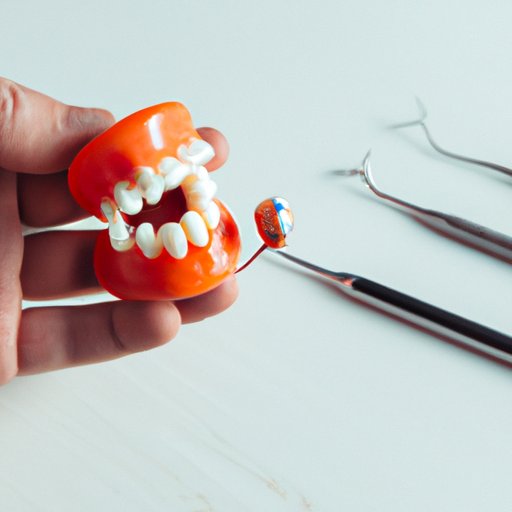
Introduction
Have you ever experienced a toothache that made you consider pulling your own tooth? It can be tempting to take matters into your own hands, but is it safe? In this article, we will explore the risks and rewards of DIY dentistry and provide you with the information you need to make an informed decision about whether to pull your own tooth or leave it to the professionals.
DIY Dentistry: Is Pulling Your Own Tooth Safe?
Pulling your own tooth may seem like an easy and cost-effective solution to tooth pain, but it is not without risks. According to a study published by the Journal of the American Dental Association, there has been a significant increase in dental injuries caused by DIY dentistry in recent years.
These injuries are often caused by lack of training and improper tools. Using household items to try to extract a tooth can lead to complications such as broken teeth, infection, and nerve damage.
The Pros and Cons of Attempting to Pull Your Own Tooth
Before deciding on pulling your own tooth, it is important to weigh the pros and cons. One advantage is cost. Without insurance, dental procedures can be expensive, and pulling your own tooth can save you money. However, the disadvantages far outweigh the benefits.
Attempting to pull your own tooth can be painful and cause further damage if done incorrectly. A failed attempt can result in the need for emergency dental care, which can end up costing more than a professional extraction.
That said, there are rare cases of successful DIY extractions. Some people have reported being able to extract their own teeth with minimal pain and no complications. However, these are not common cases, and they should not be used as a benchmark for everyone.
The Do’s and Don’ts of Trying to Pull Your Own Tooth
If you do decide to pull your own tooth, there are a few things you need to do to ensure a safe and successful extraction. Firstly, sterilize your tools. Use only sterile dental pliers, not household pliers, and apply pressure in a slow and steady manner. If you experience severe pain or bleeding, stop immediately and seek professional help.
Do not use household items such as string or hooks, which can cause damage to surrounding tissues and nerves. Do not attempt to extract a tooth that is not fully loose, and do not force it out if it is too stubborn to come out.
How to Know When It’s Time to Call a Dentist vs. Trying to Pull Your Own Tooth
Knowing when to call a dentist is essential for maintaining the health of your teeth. In general, you should call a dentist if you experience severe pain, swelling, or bleeding, or if you notice any unusual growths in your mouth. It is also important to have regular dental check-ups to catch any problems before they become serious.
If your tooth is loose and causing discomfort, it may be tempting to pull it out yourself. However, if the tooth is still partially attached or if you experience significant pain, you should see a dentist. They will be able to assess the situation and determine the best course of action.
The Risks Involved in Pulling Your Own Tooth and Why You Should Think Twice Before Trying
Pulling your own tooth can lead to a host of complications. Infection is a real risk, as bacteria can easily enter the wound and cause a severe infection. Nerve damage is also a possibility, which can result in numbness, tingling, and even partial paralysis of the face.
If the tooth breaks during extraction, additional surgery may be required to remove the remaining pieces. This can further increase the risk of infection and other complications.
For these reasons, it is important to think twice before attempting to pull your own tooth. The risks are too high to take the chance that you may do more harm than good.
Conclusion
In conclusion, pulling your own tooth may seem like an easy solution to tooth pain, but it is not without risks. Attempting DIY dentistry can lead to severe injuries and complications, and it is important to seek professional help if you experience severe pain, swelling, or bleeding.
The cost of professional dental care may seem steep, but it is a small price to pay for the health of your teeth and gums. Make sure to have regular check-ups and maintain good dental hygiene to avoid future problems. Remember, your teeth and gums deserve the best care possible, and professional help is the safest solution.




